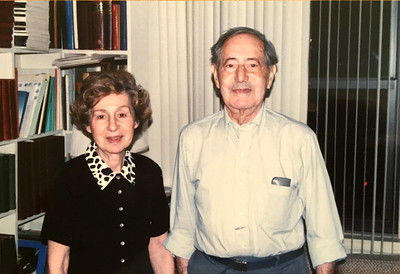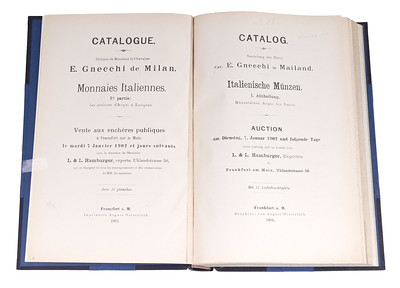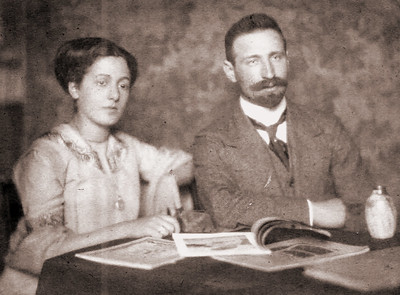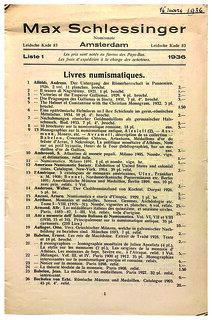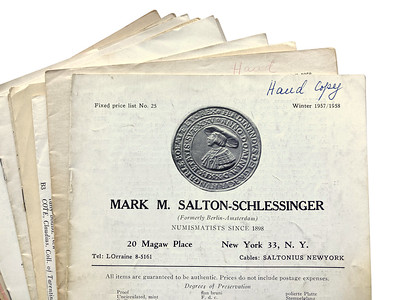
PREV ARTICLE
NEXT ARTICLE
FULL ISSUE
PREV FULL ISSUE
V25 2022 INDEX E-SYLUM ARCHIVE ORIGINS OF THE GERMAN COIN TRADEKünker issued this press release consisting of a new article by Ursula Kampmann on the origins of the German coin trade. -Editor
Origins of the German Coin Trade: The Hamburger and Schlessinger Families
To mark the auction of the Salton collection, Künker and Stack's Bowers Galleries asked historian Ursula Kampmann to research the history of the Hamburger-Schlessinger coin trading dynasty. Her findings have revolutionized our knowledge of the German coin trade. Mark Salton (1914-2005), who built up a very impressive coin collection together with his wife Lottie (1924-2020), was descended from arguably the most important dynasty of German coin dealers before the First World War. Behind the American name Mark Salton was actually Max Schlessinger, son of Felix Schlessinger (1879-1944), who was himself a nephew of Leo Hamburger the younger (1846-1929). Leo Hamburger the younger, in partnership with his cousin Leo Hamburger the elder (1836-1902), built up the most important German coin dealership of the pre-1914 era.
Origins Joseph and Jakob opened a profitable intermediary business together in Hanau. Their business thrived until the construction of the railway, which changed the rules of the game. Suddenly, factory owners were sending their own agents, while Hanau's retailers started buying their goods in Frankfurt, where they had a greater selection to choose from. These business difficulties had a concrete impact on the life of Joseph Hamburger's eldest son Leo. Namely, his father could not to pay an apprenticeship premium for his son. He was grateful when a friend arranged an apprenticeship for the fourteen-year-old Leo free of charge, at the Jewish bank Oberndörffer in Munich.
Leo Hamburger the Elder
Leo Hamburger the Younger We don't know what kind of training the younger Leopold Hamburger had. In any case, he bought into his cousin's coin dealership as a partner, using the dowry of his wife Meta Feuchtwanger to do so. This marriage was probably arranged by Leo Hamburger the elder himself. He had met and grown close to the Feuchtwanger family during his apprenticeship in Munich. From 1889 onward, the two cousins held regular auctions under the name L. & L. Hamburger. The collections sold there, such as those compiled by Prince Alexander of Hesse, Ercole Gnecchi, Carl Friedrich Pogge, Paul Stroehlin, and Hans Wunderli von Muralt, illustrate the significant role that the L. & L. Hamburger auction house played in the German coin trade before the First World War. The research into the Hamburger-Schlessinger coin trading dynasty suggests that marriage ties could have played a crucial role in the establishment of German coin dealerships. One secondary finding of the research may prove to be key evidence of this: a mutual cousin of the two Leo Hamburgers married Adolph Hess, who was probably the founder of the coin dealership of the same name, which he relocated to Frankfurt in 1871.
A Struggle for the Inheritance
The Joining of the Hamburger and Schlessinger Families But an opportunity presented itself to Felix in the form of another, far worse tragedy: in 1904, the only son of Leo Hamburger the younger took his own life – due to heartache, according to family rumours. Leo Hamburger took the penniless eldest son of his sister Röschen into his home, so that he could one day take over his coin dealership.
Felix Schlessinger Likely through the mediation of Leo Hamburger the younger, Felix married Hedwig Feuchtwanger, a cousin of the famous writer Lion Feuchtwanger. In connection with this marriage, Leo Hamburger the younger made Felix Schlessinger his partner, along with his son-in-law David Nussbaum. During the First World War, Felix Schlessinger served on the front line as a reserve non-commissioned officer. He fought in the Battle of Verdun, was wounded, buried alive, and awarded the Iron Cross for his courage.
Felix's personality is perhaps demonstrated by this characteristic episode recalled by his sister Sophie: Ernst Wachtel, the husband of Felix's eldest sister Rosalie had been sentenced – rightly or wrongly, that remains undecided – to several years in prison for
After the war, Felix Schlessinger returned to Frankfurt, where the coin dealership – like the German coin trade as a whole – suffered enormous losses during the period of hyperinflation. At that point, Leo Hamburger the younger was so old that he could no longer understand reality. As a result, by 1923, the most famous coin dealership in Germany was more or less bankrupt. The business that Felix Schlessinger was once supposed to inherit no longer existed. So, Felix decided to go to Berlin to start his own coin dealership there. This was a great success. Among his most important auctions was that of the
The End of the Jewish Coin Trade in Germany Once again, Felix Schlessinger built a new life for himself. He held a series of auctions at his Amsterdam coin dealership and provided his son Max with the means to open his own coin dealership at Leidsche Kade 83. But on May 10, 1940, the German Wehrmacht invaded the Netherlands, Belgium, and Luxembourg. A German government was installed, which not only confiscated Felix Schlessinger's coin dealership, along with his library and inventory, but also deported Hedwig and Felix Schlessinger, sending them first to Westerbork transit camp, then to Theresienstadt concentration camp, before murdering them in the gas chambers of Auschwitz on October 25, 1944.
Max Schlessinger Becomes Mark Salton The Dutch embassy in Lisbon offered the multilingual Max Schlessinger a job. He probably would have become a high-ranking diplomat in the Netherlands if he hadn't decided to emigrate to the USA after the end of the Second World War. When he arrived there, he adopted the name Mark Salton. He married the young Lottie Aronstein, who had suffered a fate similar to his own, within just three months of meeting her. Lottie had fled with her father and little brother shortly after the November pogroms and, after an odyssey halfway around the world, arrived in New York, where she earned her living as a diamond cutter.
Building the Salton Collection But just shortly after his arrival, Mark Salton found work as an analyst in the international department of Manufacturers Hanover Trust Company, one of the largest banks in New York at the time. He built up such a successful career that coin trading was no longer necessary. In 1966, he and his wife went to Rome for several years to run the Italian branch of Manufacturers Hanover Trust. During this time, the couple turned from dealers into collectors, with a particular interest in the art form of medals. Mark Salton died after a fulfilled life on December 31, 2005, at the age of 92. He was followed in death by his beloved wife Lottie Salton, née Aronstein, on April 18, 2020. The couple leaves us with a moving testament to the fact that, despite even the most terrible experiences, it is possible to start over. They decided to donate the proceeds from their collection to organizations that commit themselves to the remembrance of the victims of the Holocaust, to ensure that their fate is hopefully never repeated. It is a great honor for Künker and Stack's Bowers Galleries that Lottie and Mark Salton have stipulated in their will that their numismatic collection be auctioned by the two auction houses in the USA and Germany. Künker has published a brochure in English and German detailing the story of the Hamburger, Schlessinger, and Aronstein families, as researched by Ursula Kampmann. You can view this brochure online (https://www.kuenker.de/data/kataloge/Kuenker_Broschuere_Salton-Collection_en.pdf) or order a copy from Künker for a nominal fee of 10 euros.
Wayne Homren, Editor The Numismatic Bibliomania Society is a non-profit organization promoting numismatic literature. See our web site at coinbooks.org. To submit items for publication in The E-Sylum, write to the Editor at this address: whomren@gmail.com To subscribe go to: https://my.binhost.com/lists/listinfo/esylum All Rights Reserved. NBS Home Page Contact the NBS webmaster 
|
